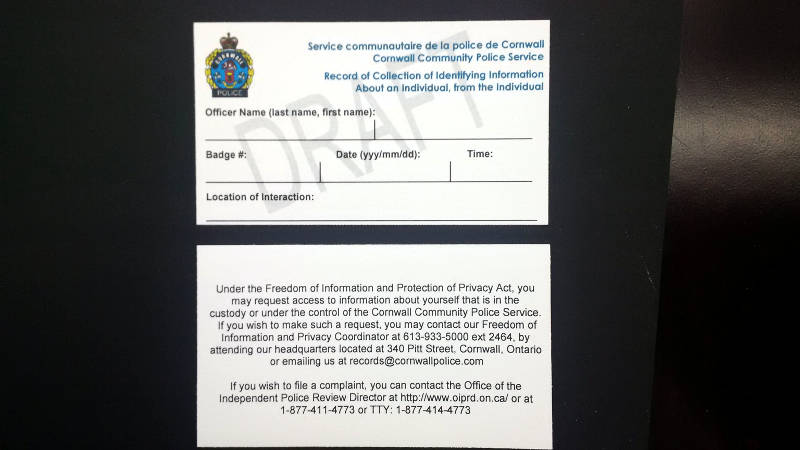
CORNWALL – City police officers will have new rules covering how they interact with people in Cornwall, especially when it comes to random checks or traffic stops.
The Cornwall Police Services Board enacted the new rules around the “regulated interaction” of the public – the collection of identifying information, commonly known as street checks or carding.
The bylaw is meant to comply with a provincial law, which goes into effect Jan. 1, 2017, in order to curb discrimination or bias-based police stops or checks.
Police officers will have to tell people that are randomly stopped that they have a right not to talk with them and walking away cannot be held against them.
Cornwall officers will also be giving out so-called “contact cards” during random stops – an English draft card was passed around the board table Wednesday morning. A French one will also be produced.

“It’s more used for an officer initiated interaction with a person in the public domain. On the bike path at two o’clock in the morning, what are you doing here? Not right now, but the rules are (as of Jan. 1), ‘Who are you? What are you doing here? But you don’t have to tell me’,” Chief Dan Parkinson told the board.
But people who interact with police don’t have to take the card either.
The interactions, where information is collected, will be recorded and will come to the board for review, in accordance with the new Ontario law.
“Very complex move from where we have traditionally been,” Parkinson said. “We take great pride in interacting with our community informally as part of community policing. We hope and trust by the proper training and the acceptance of this regulation, both by the public and the police, we will maintain that positive relationship with the community.”
Police can still gather information if someone is being arrested, detained or during a search warrant.
Board member Pat Finucan wondered if the new policy would be “a source of tension” that could lead to more arrests.
“It doesn’t prevent an officer from doing what they used to do, forming the grounds to make a lawful arrest or detention,” Parkinson answered.
City officers have already went through a full day of training on the new legislation, the chief added.
Parkinson said the reception by his officers has been “good…perhaps better than we had anticipated” and would not characterize officers as “unhappy” about the new bureaucracy.
“We think it’s going to be business as usual but with a different method of accounting for the business of community engagement.”
